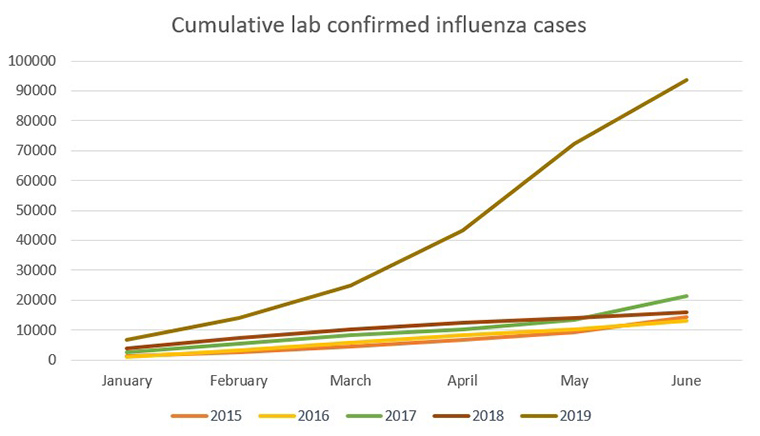News
Another state lowers age limit for pharmacy vaccinations
Western Australia will allow pharmacists to provide influenza vaccinations to children as young as 10 after a spate of flu-related deaths.
 Western Australia is the second state allow pharmacy-administered flu vaccines for children as young as 10.
Western Australia is the second state allow pharmacy-administered flu vaccines for children as young as 10.
Western Australia is in the grip of its worst flu season on record, with more than 9000 cases reported and 29 fatalities since the start of the year, compared with four deaths and 1300 diagnosed cases at the same stage in 2018.
According to The West Australian, 14 people have died in the past week alone, leading State Health Minister Roger Cook to announce steps to try to slow its spread.
‘I have instructed the Director General and our chief medical officer to extend the flu vaccination reach of our pharmacies from 18 down to 10,’ Mr Cook said.
‘We want to make sure that everyone has the maximum opportunity to get themselves vaccinated.’
A WA Health spokesperson told newsGP the age limit was lowered as an ‘urgent public health measure’ designed to maximise the uptake of influenza immunisation in WA.
‘The decision to lower the age of pharmacy vaccination … was necessary to assist in managing the current severe influenza outbreak in Western Australia,’ the spokesperson said.
‘The safest and most appropriate age for pharmacists to immunise against influenza has been in consideration for some time as part of work under the Council of Australian Governments Health Council to progress a consistent national approach towards pharmacy vaccination.
‘GPs were not consulted directly prior to this decision being made but the Department of Health has been in regular contact with medical and other health bodies about the current influenza season, and was well aware of the positions of both the RACGP and AMA on pharmacy vaccinations.’
However, RACGP WA Faculty Chair Dr Sean Stevens told newsGP there is still capacity within general practice to provide influenza vaccinations, and said the main issue has actually been accessing supply of the vaccines.
‘I’m disappointed we weren’t consulted. This has been on the radar for quite a while now, but I don’t think it’s warranted,’ he said.
Dr Stevens also said he had clinical concerns regarding pharmacists administering flu shots, in particular with regard to fragmentation of care.
‘If kids haven’t had the vaccine, the GP needs to know about it. We need to know whether we should be pushing for it [and] we need to know what other vaccinations they’ve had,’ he said.
‘It’s part of standard care and it really needs to be part of the patient’s care within their regular general practice.
‘The safest place for a patient of any age to be vaccinated is with a GP or in a medical facility where there is the ability to treat the complications that very rarely can arise.’
Aside from clinical concerns, Dr Stevens added that potentially less stringent cold chain management outside of GP clinics could lessen the effectiveness of vaccines.
‘The vast majority of general practices are accredited and one of the key standards … is close monitoring of cold chain,’ he said.
‘Every general practice is aware of it, we have a program to monitor the cold chain and procedures to deal with any breach of the cold chain. It’s not as well monitored outside of a controlled medical setting.’

Total nationwide influenza notifications from January to June over the past five years. (Source: National Notifiable Diseases Surveillance System)
The high number of influenza cases in Western Australia has reportedly led to ambulance ramping outside emergency departments (EDs), and Minister Cook has urged people experiencing flu symptoms to visit their GP before presenting at hospitals.
‘The EDs are doing an incredible job dealing with this unprecedented flu season, but it does mean that our EDs are under pressure and it does mean that there might be a longer wait than usual,’ he said.
‘That emphasises the point that if people are feeling unwell they should go to their GP to get the care they need.
‘If they are having respiratory distress and if their symptoms are becoming more severe then obviously the ED is the best place for them.’
The expansion of Western Australia’s vaccine program follows a concerted campaign from pharmacy advocates, as well as a previous decision by Tasmanian Health Minister Michael Ferguson to allow pharmacists in the state to administer vaccines to 10-year-olds.
That latter move was heavily criticised by RACGP President Dr Harry Nespolon, who described it as ‘baffling’.
‘It’s quite simple; pharmacists don’t have the medical training required to safely deliver vaccinations and respond to associated risks, such as anaphylaxes,’ he said.
‘This appears to be another attempt by the pharmacy sector to put financial gains over quality patient care and safety.
‘All patients, no matter their age, should receive their flu vaccination from their usual GP.’
Pharmacy-administered flu vaccine age limits by state and territory:
- ACT: 16 (2019)
- NSW: 16 (2019)
- NT: 16 (2017)
- QLD: 16 (2019)
- SA: 16 (2015)
- Vic: 16 (2018)
- Tas: 10 (2019)
- WA: 10 (2019)
Note: This article has been updated with comments from a WA Health spokesperson.
influenza pharmacy vaccination
newsGP weekly poll
Are you interested in prescribing ADHD medication?